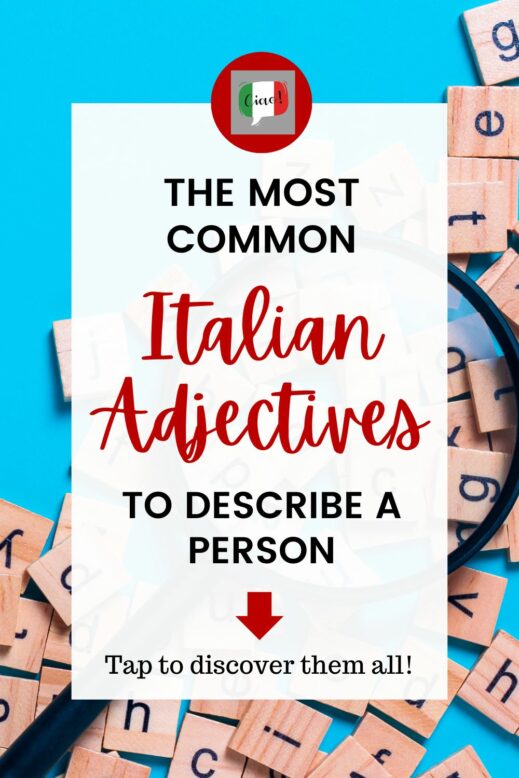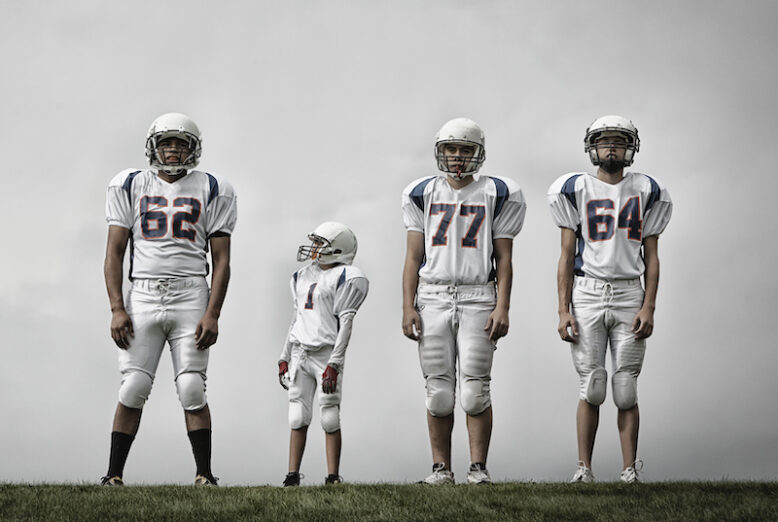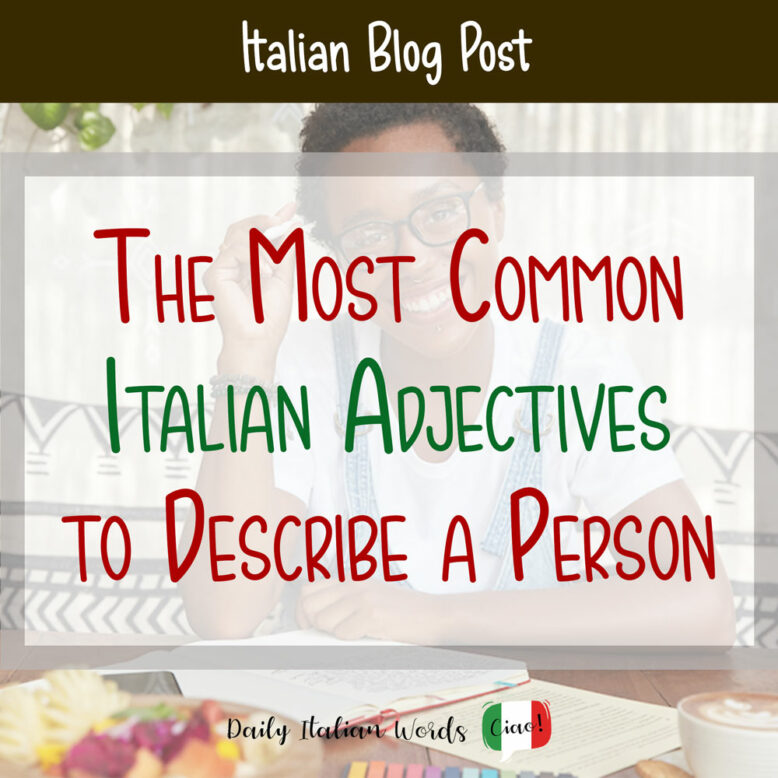In all languages, including Italian, we can describe a person in two different ways. On one hand, we can describe their physical appearance and on the other, their character. Let’s take a look at how we can do this in Italian using the most common adjectives to describe a person.

Describing a person with adjectives: Physical appearance
When we see a person, the first thing we do, either consciously or unconsciously, is take note of what they look like. We may notice how tall they are, whether they are fit or not, we may get an idea of their age and we notice details such as the colour of the eyes and hair, or the size of the nose and lips. But how can we go about describing these physical characteristics to someone in Italian? Here is a useful list of common adjectives you can use.
Altezza (Height)
Alto / Alta
Alti / Alte
Tall
Basso / Bassa
Bassi / Basse
Short
Media statura
Medium height
Giovanni è proprio alto.
Giovanni really is tall.
Io sono sempre stata la bambina più bassa della classe.
I’ve always been the shortest girl in the class.
Quanto è alto Giovanni? Sarà di media statura.
How tall is Giovanni? He’s medium height.

I capelli (hair)
Important: In Italian, hair is always considered plural whereas in English, we treat it as a mass noun. For this reason, all of the following adjectives have been written in their masculine plural form.
Il colore dei capelli (Hair colour)
Biondi
Blonde
Rossi
Red
Neri
Black
Grigi
Grey
Castani
Brown
Bianchi
White
La tipologia dei capelli (Hair type)
Lisci
Straight
Corti
Short
Mossi
Wavy
Lunghi
Long
Ricci
Curly
Crespi
Frizzy
Giorgia ha i capelli rossi, un po’ mossi e credo ora li abbia lunghi.
Giorgia has red hair that’s a bit wavy, and I believe it’s long as well.
Le ragazze hanno i capelli biondi, lunghi e liscissimi.
The girls have long, blonde, straight hair.
Ho visto un ragazzo con i capelli neri e ricci. Era meraviglioso!
I saw a guy with curly black hair. He was gorgeous!

Il naso (nose)
Sottile
Thin / Slim
Grosso
Large
Largo
Wide
A patata
Button
Lungo
Long
Appuntito
Pointy
La mia bambola ha un nasone a patata.
My doll has a button nose.
Beata te che hai un nasino così sottile.
You’re so lucky to have such a slim nose.
Mio nonno aveva un naso grosso.
My grandfather had a large nose.

Le labbra (lips)
Carnose
Thick / Plump
Sottili
Thin
Le mie labbra preferite sono quelle carnose.
Plump lips are my favourite.
Hai ereditato le labbra sottili di tuo padre
You’ve inherited your father’s thin lips.

La barba (beard)
Lunga
Long
Morbida
Soft
Corta
Short
Ispida
Prickly
Non riesco mai a darti un bacio con quella barba lunga e ispida.
I can never kiss you with that long, prickly beard.
Da quando ti conosco hai la barba corta.
You’ve had a short beard for as long as I’ve known you.

La forma del corpo (body shape)
Magro / Magra
Magri / Magre
Skinny
Grosso / Grossa
Grossi / Grosse
Big, large
Snello / Snella
Snelli / Snelle
Slim
Grasso / Grassa
Grassi / Grasse
Fat
Tu sei sempre stato magro.
You’ve always been skinny.
Non posso dire che sia grasso, è solo un po’ fuori forma.
I can’t say that he’s fat, he’s just a bit out of shape.

L’età (age)
Giovane / Giovani
Young
Vecchio / Vecchia
Vecchi / Vecchie
Old
Di mezza età
Middle aged
Anziano / Anziana
Anziani / Anziane
Old (more polite)
Quando ti ho conosciuto eri così giovane.
You were so young when I met you.
Quando sarò vecchia andrò a vivere al mare.
When I’m old I’m going to live by the sea.

L’aspetto generale (Overall appearance)
Bello / Bella
Belli / Belle
Handsome / Beautiful
Normale / Normali
Normal, average
Carino / Carina
Carini / Carine
Cute / Nice
Brutto / Brutta
Brutti / Brutte
Ugly
Non dirmi che trovi bello Mario!
Don’t tell me you find Mario handsome!
La trovo così carina. Ha un sorriso dolcissimo.
She’s so cute. She has such a sweet smile.

Describing a person with adjectives: Personality
We know that physical appearance is not everything. The body describes only part of a person – their personality, character and way of behaving do the rest.
Here is how we can describe a person in Italian using very common adjectives referring to the character or personality of an individual.
Aperto o chiuso
Aperto / Aperta / Aperti / Aperte = Open
Chiuso / Chiusa / Chiusi / Chiuse = Closed
Sei così aperta e tollerante verso gli altri.
You’re so open and tolerant towards other people.
Non sono mai riuscito a creare un rapporto con lui. È troppo chiuso, troppo silenzioso.
I’ve never been able to get along with him. He’s too closed, too quiet.

Sorridente/allegra o triste/imbronciata
Sorridente / Sorridenti = Smiling, cheerful, good-natured
Allegro / Allegra / Allegri / Allegre = Happy, cheerful
Triste / Tristi = Sad
Imbronciato / Imbronciata / Imbronciati / Imbronciate = Sullen, sulky
È sempre così sorridente e allegra. Mi mette proprio di buon umore.
She’s always so cheerful and happy. She really puts me in a good mood.
Non ho voglia di vedere Giorgio. È sempre imbronciato.
I don’t feel like seeing Giorgio. He’s always sullen.

Espansivo o timido
Espansivo / Espansiva / Espansivi / Espansive = Outgoing, warm, exuberant
Timido / Timida / Timidi / Timide = Shy
È talmente espansiva che ti fa sentire subito a tuo agio.
She is so exuberant that she immediately makes you feel at ease.
Non essere timido, prova a dire la tua opinione.
Don’t be shy, try to state your opinion.

Gentile o maleducata
Gentile / Gentili = Kind, courteous, polite
Maleducato / Maleducata / Maleducati / Maleducate = Rude, ill-mannered
Sei molto gentile a pensare a me.
You’re very kind to think of me.
Non ho mai incontrato nessuno di così maleducato.
I’ve never met someone so rude.

Simpatico o antipatico
Simpatico / Simpatica / Simpatici / Simpatiche = Nice, kind, fun
Antipatico / Antipatica / Antipatici / Antipatiche = Unkind, unpleasant
Francesca è simpaticissima. Mi fa morire dal ridere.
Francesca is so nice. She makes me laugh so hard.
Non mi aspettavo quella risposta. È stato molto antipatico.
I wasn’t expecting that response. It was very unpleasant.

Estroversa, socievole o introversa
Estroverso / Estroversa / Estroversi / Estroverse = Extroverted
Socievole / Socievoli = Sociable
Introverso / Introversa / Introversi / Introverse = Introverted
Sei così socievole che fai amicizia in pochi minuti.
You are so sociable that you make friends in a matter of minutes.
È così introversa che sarebbe dura per lei cambiare classe.
She’s so introverted that she’d find it hard to change classes.

Divertente o noioso
Divertente / Divertenti = Fun
Noioso / Noiosa / Noiosi / Noiose = Boring
Dovevi fare l’attore comico. Sei troppo divertente.
You should have been a comedian. You’re so funny.
Non ho voglia di uscire con lui, è noioso.
I don’t want to go out with him, he’s boring.

Intelligente o ottuso
Intelligente / Intelligenti = Smart, intelligent
Ottuso / Ottusa / Ottusi / Ottuse = Slow, obtuse
Claudio è una delle persone più intelligenti che conosca.
Claudio is one of the most intelligent people I know.
Niente, non vuole ragionare. È ottuso.
Forget it, he won’t listen to reason. He’s obtuse.


Allegra Lucarelli, known professionally as allegraLu, is a certified Neurolanguage Coach for child bilingualism and a native Italian speaker who speaks English fluently. She helps families raise their children to be bilingual and multilingual at AllegraLu.com.


